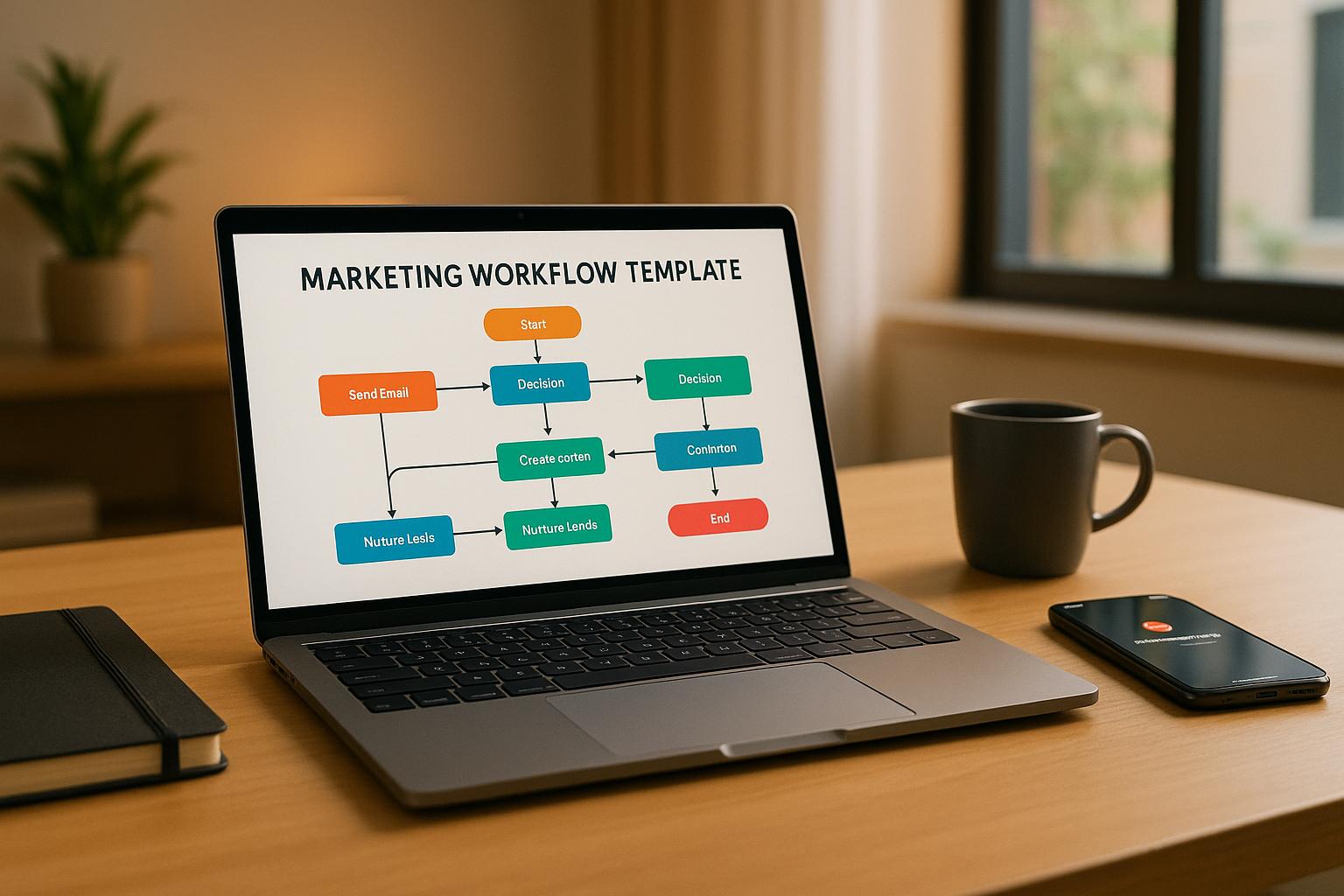AI is reshaping real estate marketing in 2025. From virtual tours to lead scoring, these tools are helping agents save time, cut costs, and close deals faster. Here’s a quick look at the top 7 AI tools driving this change:
- Growth-Realty: Creates virtual staging and 3D tours, reducing staging costs by 90% and speeding up property sales by 31%.
- Maverick: Scores leads based on buyer behavior, boosting conversions by 30%.
- Ylopo: Auto-generates video ads for properties, increasing listing views by 500%.
- Structurely: AI chat assistant that qualifies leads 24/7, improving engagement rates by 42%.
- Frase: Multilingual property listings that expand global reach, increasing international leads by 45%.
- Zillow: Advanced price analysis tools with a 1.9% error rate for on-market homes.
- AscendixRE: AI-powered CRM that automates tasks and improves efficiency by 78%.
These tools combine automation, data insights, and global reach to help real estate professionals work smarter, not harder.
7 Mind-Blowing A.I. Tools EVERY Realtor Should Be Using In 2025
1. Growth-Realty: Virtual Staging and 3D Tours

Growth-Realty is transforming how properties are showcased, aligning with the trend toward virtual presentations. Their tools support the growing demand for faster sales, with virtual staging helping properties sell 31% faster compared to traditional methods.
With Growth-Realty’s AI, empty spaces can be virtually staged in just minutes, compared to the days it takes for traditional staging. Plus, it’s done at a fraction of the cost – up to 90% less. The platform also offers multiple design styles instantly, catering to a wide range of buyer preferences.
Immersive 3D Tours: Growth-Realty’s 3D tour technology takes property viewing to the next level using advanced computer vision. Features include:
- Measurement tools for accurate dimensions
- VR-ready tours with 24/7 access
- Interactive info hotspots for added details
Listings with these virtual tours perform significantly better, receiving 87% more views compared to traditional listings. For example, Luxury Homes Realty in Miami reported a 45% faster market turnover for luxury properties priced over $2 million after adopting these tools.
Ensuring Accuracy: Growth-Realty uses LiDAR technology for precise room measurements and real-time rendering to achieve realistic lighting effects. A secondary AI system identifies any inconsistencies, and design experts review all content before it’s finalized.
"Sold a $15M penthouse to an overseas buyer who never visited in person".
The platform also supports lead generation by offering 24/7 virtual access. With APIs and embed codes, users can integrate staged content into MLS listings and social media platforms seamlessly.
2. Maverick: Smart Lead Scoring System

Maverick leverages AI to revolutionize how real estate agents prioritize potential buyers. By analyzing property search patterns, website activity, and financial pre-qualification data, it generates real-time lead scores. This approach helps drive the 30% conversion boost highlighted earlier, ensuring agents focus on the most promising prospects. Like Growth-Realty’s virtual access, Maverick operates around the clock, so no opportunities slip through the cracks.
The system assesses factors such as:
- Website engagement: How often and how long users interact with your site
- Property preferences: Buyers’ history of viewed or saved listings
- Social media activity: Interactions related to real estate topics
- Email and financial readiness: Responsiveness and indicators of buying capacity
It integrates seamlessly with CRMs like AscendixRE (discussed later) and property databases, making it a versatile tool for real estate professionals. A Keller Williams San Francisco case study highlights its effectiveness:
"Within 90 days, our team saw a 42% increase in qualified leads and 28% more closed deals"
Maverick prioritizes data security with military-grade encryption and full compliance with GDPR and CCPA standards. Its AI audits use diverse training data to minimize bias and maintain fairness.
Starting at $99/month ($249 for team plans), Maverick boasts a 4.7/5 rating on G2 and was named PropTech Outlook’s 2024 ‘Best AI Tool for Lead Generation’.
3. Ylopo: Auto-Generated Video Ads

Ylopo takes lead conversion to the next level with dynamic, AI-driven video ads. By analyzing property data and MLS listings, the platform creates professional video content – no manual editing skills required.
Here’s what Ylopo’s AI brings to the table:
- Formats optimized for Facebook, Instagram, and YouTube
- Real-time updates with the latest property details
- Multilingual voiceover options
- A/B testing for quick performance improvements
One standout example is Smith Realty Group in California, which used Ylopo in 2024:
"We saw a 500% increase in listing views within the first week, generated 150 qualified leads, and secured three offers within 10 days. The property sold 15% above asking price".
Ylopo taps into two major 2025 trends: better property showcasing and smarter campaign automation. Its AI uses predictive analytics and dynamic retargeting to fine-tune ad targeting. By analyzing viewer behavior, it identifies potential buyers and adjusts placement for the best results. Users have reported a 300% boost in lead generation and a 40% drop in lead acquisition costs.
The platform also ensures compliance by automatically adding required disclosures and fair housing statements. Agents can personalize branding, choose voice styles, and craft call-to-action messages. For each listing, Ylopo creates up to 15 video variations, tested through A/B optimization.
Pro Tip: Add a personal touch by customizing your video ads with your branding and clear calls-to-action. Let Ylopo handle the technical stuff, like formatting and distribution, while you focus on connecting with your audience. This approach combines automation with a human element for the best results.
sbb-itb-2f9da9d
4. Structurely: AI Chat Assistant

Structurely’s AI chat assistant, "Holmes", is transforming how real estate professionals engage with leads. Unlike tools focused on content creation, Holmes uses conversational AI to handle property inquiries 24/7. With advanced natural language processing, it can tackle detailed questions about properties, neighborhoods, and market trends. This helps agents focus on more strategic tasks by automating routine conversations.
Holmes is particularly effective at qualifying leads. By analyzing conversation patterns and engagement, it assesses factors like property preferences, timelines, and financial readiness. Based on this data, prospects are sorted into categories like hot, warm, or cold leads. The results speak for themselves – Structurely reports a 42% boost in lead engagement rates across over 100 million messages.
The AI also identifies buyer or seller intent through real-time conversation analysis. It adapts its approach dynamically while ensuring the dialogue stays consistent with your brand voice. With 99.9% uptime and support for over 100 languages, Holmes integrates seamlessly with CRMs like Follow Up Boss, Realvolve, and Chime, syncing lead data, conversation logs, and qualification scores automatically.
Key metrics tracked in the analytics dashboard include:
- Engagement rates, such as conversation depth and duration
- Lead quality scores and conversion rates
- Average response times
- ROI from AI-driven deals
Pro Tip: Tailor Holmes’ conversation flows to match your brand’s tone and include specific qualifying questions for a more personalized touch.
Pricing starts at $179/month, with options for team scaling. The mobile app for iOS and Android allows agents to monitor or step into chats anytime. With its blend of flexibility, detailed analytics, and seamless CRM integration, Structurely is a game-changer for real estate marketing.
5. Frase: Multi-Language Property Listings
Frase takes multilingual property listings to a new level by using AI to break down language barriers. It can generate property descriptions in over 100 languages, ensuring accurate use of real estate terminology. This aligns perfectly with the push for workflow automation, saving time on listing preparation while increasing visibility to a global audience.
Much like Growth-Realty’s virtual staging or Maverick’s lead scoring, Frase tackles a major challenge: reaching international buyers in a global market. The AI automatically adjusts measurements and real estate terms for local contexts. For example, "3,500 sq ft beachfront condo" is transformed into "325 metros cuadrados apartamento frente al mar" in Spanish or "325平方米的海滨公寓" in Chinese.
It doesn’t stop there. The platform adds region-specific legal disclosures and formats listings to meet local requirements. Real estate agencies using Frase have seen a 45% increase in international leads and cut their global listing preparation time by 30%.
Frase integrates directly with Zillow and Realtor.com via API, ensuring real-time updates to listings worldwide. Its analytics dashboard offers insights into international traffic, engagement rates by language, conversion metrics across cultures, and SEO performance in target markets.
Mid-sized agencies have reported earning $150,000 more in commissions from international sales within their first year of using Frase. Pricing starts at $199/month for 50 listings in three languages, with higher tiers like $499/month covering 200 listings in five languages.
Frase’s impact is clear from its 4.5/5 stars rating on G2, based on 237 reviews. Users highlight its ability to keep branding and messaging consistent across all language versions. With its AI-powered translations, regulatory compliance features, and seamless integrations, Frase has become a must-have tool for real estate professionals aiming to expand their global reach in 2025.
6. Zillow: Price Analysis Tools

Zillow’s pricing tools are designed to deliver precise property valuations for both local and international markets. Their well-known Zestimate now boasts a 1.9% median error rate for on-market homes. This aligns with the focus on data-driven efficiency by streamlining listing preparations with greater accuracy and speed.
The platform’s AI system evaluates more than 500 data points per property. It incorporates information from satellite imagery, 3D scans, and economic indicators like employment rates to assess properties comprehensively.
One standout feature is the renovation value calculator. This tool allows agents to showcase potential returns on investment (ROI) to clients. Similar to Maverick’s lead scoring, Zillow’s investment ratings highlight high-potential opportunities. These ratings are generated by combining rental market trends with neighborhood growth forecasts.
| Property Type | Error Rate | Update Frequency |
|---|---|---|
| On-Market Homes | 1.9% | Daily |
| Off-Market Homes | 6.9% | Weekly |
| Luxury Properties | 4.5% | Bi-weekly |
| Investment Properties | 3.2% | Daily |
To ensure fairness, Zillow employs bias detection algorithms that provide transparent insights into valuation factors. For unique or luxury properties, the AI system compares similar homes across regional markets and allows agents to override valuations when needed. Currently, Zillow’s tools cover 104 million homes across the U.S..
These features integrate seamlessly with AscendixRE’s CRM (discussed in the next section). Tools like automated comparative market analysis (CMA) and predictive modeling help agents create listings more efficiently while offering clients valuable market insights based on data.
7. AscendixRE: Smart CRM System

AscendixRE is a CRM platform designed for real estate professionals, leveraging AI to streamline client relationship management. By automating workflows, it helps achieve up to 78% efficiency gains, aligning with trends seen in tools like Zillow’s data-driven systems.
The platform uses AI to match properties with buyers by analyzing MLS data and online activity patterns. Users can access mobile profiles that include interaction histories, offering a seamless way to manage leads. It integrates property data from platforms like Zillow and MLS databases, similar to how Frase handles global integrations.
| Feature | Benefit | Implementation Time |
|---|---|---|
| Automated Task Management | Cuts admin work by 25% | 1 month |
| Client Retention | Boosts retention by 10-15% | 12 months |
One of its standout features is the ability to update records via voice commands during property tours. It also generates personalized communication templates based on each client’s interaction history, saving time while enhancing engagement.
To ensure data security, AscendixRE employs military-grade encryption and anomaly detection, meeting GDPR and CCPA standards. Enterprise clients benefit from tailored onboarding and customized training programs to ensure smooth adoption of the platform.
The system connects with essential tools like DocuSign, completing the marketing automation process, much like Structurely’s chatbot integration. Pricing starts at $99 per user, per month, with enterprise options available for larger teams.
AscendixRE has earned high praise, receiving 4.7/5 stars from 156 verified users on G2. A notable 92% of users highlight its intuitive interface and AI-driven features. These accolades led to AscendixRE being named TechRadar’s "Top Real Estate CRM" in 2024.
Conclusion
AI tools have reshaped how properties are marketed and sold in 2025. According to data, 75% of real estate firms now use AI technologies for marketing and operations, leading to noticeable improvements in key performance areas.
From virtual staging to multilingual listings, these tools cater to the industry’s shift toward efficiency and data-driven strategies. The results speak for themselves: Growth-Realty has cut staging costs by 90%, Maverick increased conversions by 30%, and Frase boosted international leads by 45%.
But it’s not just about the numbers. AI-powered CRM platforms and multi-language features have expanded global market reach. As technology progresses, tools will continue to improve in areas like 3D tour realism and lead prediction accuracy.
While AI takes care of repetitive tasks, top real estate professionals focus on interpreting AI insights from tools like AscendixRE and Maverick to better serve their clients. This shift has also leveled the playing field, allowing smaller agencies to access enterprise-level tools and elevate their service standards.
The key to success lies in combining AI’s efficiency with human expertise – precisely what these seven tools for 2025 make possible.



